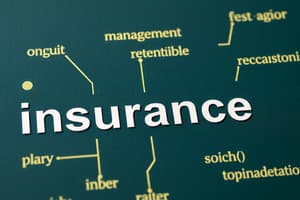Podcast
Questions and Answers
What is the specific amount of money that you pay when insurance only covers a portion of costs?
What is the specific amount of money that you pay when insurance only covers a portion of costs?
- Co-payment
- Deductible
- Premium
- Out of pocket expense (correct)
What is a legally enforceable declaration of how a person wishes his or her property to be distributed after death?
What is a legally enforceable declaration of how a person wishes his or her property to be distributed after death?
Will
Duplicate coverage, or any extra insurance on top of your existing insurance, is not necessary.
Duplicate coverage, or any extra insurance on top of your existing insurance, is not necessary.
True (A)
What do you call the amount you pay monthly, quarterly, semiannually, or annually to purchase different types of insurance?
What do you call the amount you pay monthly, quarterly, semiannually, or annually to purchase different types of insurance?
Which of the following is not a recommended way to save on your health insurance premium?
Which of the following is not a recommended way to save on your health insurance premium?
What is the purpose of insurance?
What is the purpose of insurance?
What is the time between the disabling event and the beginning of payments in your disability coverage called?
What is the time between the disabling event and the beginning of payments in your disability coverage called?
Any insurance with cash value or that combines insurance with investments is a bad idea.
Any insurance with cash value or that combines insurance with investments is a bad idea.
What type of insurance covers property damage and medical bills if you are at fault in a car accident or if someone gets hurt on your property?
What type of insurance covers property damage and medical bills if you are at fault in a car accident or if someone gets hurt on your property?
Who is the recipient of assets passed on from the death of a friend or relative?
Who is the recipient of assets passed on from the death of a friend or relative?
Good identity theft protection includes restoration services.
Good identity theft protection includes restoration services.
What is a life insurance policy for a specific period of time called?
What is a life insurance policy for a specific period of time called?
Which of the following statements about life insurance is true?
Which of the following statements about life insurance is true?
Disability insurance offered through your employer is usually the most expensive coverage option.
Disability insurance offered through your employer is usually the most expensive coverage option.
Comprehensive coverage takes care of damage to your car that is not caused by a collision.
Comprehensive coverage takes care of damage to your car that is not caused by a collision.
When does a person become self-insured?
When does a person become self-insured?
Which of the following would not be a huge financial risk if you had a full emergency fund of $500 or more?
Which of the following would not be a huge financial risk if you had a full emergency fund of $500 or more?
What is the amount of money you pay to help cover a portion of your medical costs?
What is the amount of money you pay to help cover a portion of your medical costs?
Any kind of duplicate insurance coverage is a bad idea.
Any kind of duplicate insurance coverage is a bad idea.
What describes the type of coverage in an insurance agreement?
What describes the type of coverage in an insurance agreement?
Which of the following statements about long-term care insurance is false?
Which of the following statements about long-term care insurance is false?
What is the paperwork filed with an insurance company to cover a loss for someone they insure called?
What is the paperwork filed with an insurance company to cover a loss for someone they insure called?
Following the Five Foundations will help you to, one day, become self-insured.
Following the Five Foundations will help you to, one day, become self-insured.
Which of the following types of insurance is not recommended for a young single adult?
Which of the following types of insurance is not recommended for a young single adult?
Which of the following is not a recommended way of lowering your car insurance premiums?
Which of the following is not a recommended way of lowering your car insurance premiums?
Prepaid burial policies are a good idea.
Prepaid burial policies are a good idea.
Which of the following policies would be duplicate coverage for your health insurance policy?
Which of the following policies would be duplicate coverage for your health insurance policy?
What applies to the amount of protection you have through an insurance company in the event of a loss?
What applies to the amount of protection you have through an insurance company in the event of a loss?
After high school, you should have health insurance, auto insurance, renter's insurance, and long-term care insurance.
After high school, you should have health insurance, auto insurance, renter's insurance, and long-term care insurance.
Renter's insurance is not necessary if you don't have a lot of expensive things.
Renter's insurance is not necessary if you don't have a lot of expensive things.
What is the amount you must pay before you begin receiving any benefits from your insurance company?
What is the amount you must pay before you begin receiving any benefits from your insurance company?
If you are involved in a two-car accident in which you are at fault, and your insurance covers the medical expenses of the victim, what type of insurance coverage is this called?
If you are involved in a two-car accident in which you are at fault, and your insurance covers the medical expenses of the victim, what type of insurance coverage is this called?
Which of the following is not a benefit of having a will?
Which of the following is not a benefit of having a will?
Flashcards are hidden until you start studying
Study Notes
Insurance Terms and Definitions
- Out of Pocket Expense: A specific amount paid when insurance covers only a portion of costs.
- Will: A legal declaration outlining how a person wishes their property to be distributed after death.
- Premium: The amount paid regularly (monthly, quarterly, semiannually, or annually) to purchase various types of insurance.
- Liability Insurance: Covers property damage and medical bills if you are at fault in an accident or if someone is injured on your property.
- Beneficiary: The individual who receives assets from a deceased person.
Insurance Practices and Recommendations
- Duplicate Coverage: Having unnecessary duplicate insurance is discouraged.
- Health Insurance: It's important for young and healthy individuals, as it helps manage unexpected health costs.
- Self-Insurance: Achieved when a person has no debt, grown children, and a fully funded retirement.
- Emergency Fund: A sufficiently funded emergency fund (e.g., $500) mitigates the financial risk of minor losses, such as losing a cell phone.
- Prepaid Burial Policies: Considered a poor financial decision.
Coverage and Claims
- Co-Payment: A set amount paid to cover a portion of medical costs.
- Deductible: The amount paid before receiving any benefits from the insurance policy.
- Claim: The paperwork submitted to an insurer to request coverage for a loss the insured party has encountered.
- Coverage: Refers to the level of protection provided by an insurance policy during a loss event.
Types of Insurance
- Term Life Insurance: A life insurance policy that is effective for a specified period.
- Cash Value Insurance: Typically more expensive, as it combines life insurance with a savings component.
- Long-Term Care Insurance: Not required until after age 30; misconceptions regarding the necessity for younger individuals exist.
- Comprehensive Coverage: Covers non-collision damage to your vehicle.
Miscellaneous Notes
- Identity Theft Protection: Effective protection includes restoration services to mitigate loss.
- Renter's Insurance: Important even if possessions are not valued highly; it provides essential coverage against various risks.
- Types of Insurance After High School: Auto, renter's, and health insurance are recommended; long-term care insurance may not be necessary at that stage.
- Insurance Premium Saving Strategies: Avoid dropping auto insurance entirely as it may lead to larger financial risks.
Studying That Suits You
Use AI to generate personalized quizzes and flashcards to suit your learning preferences.




